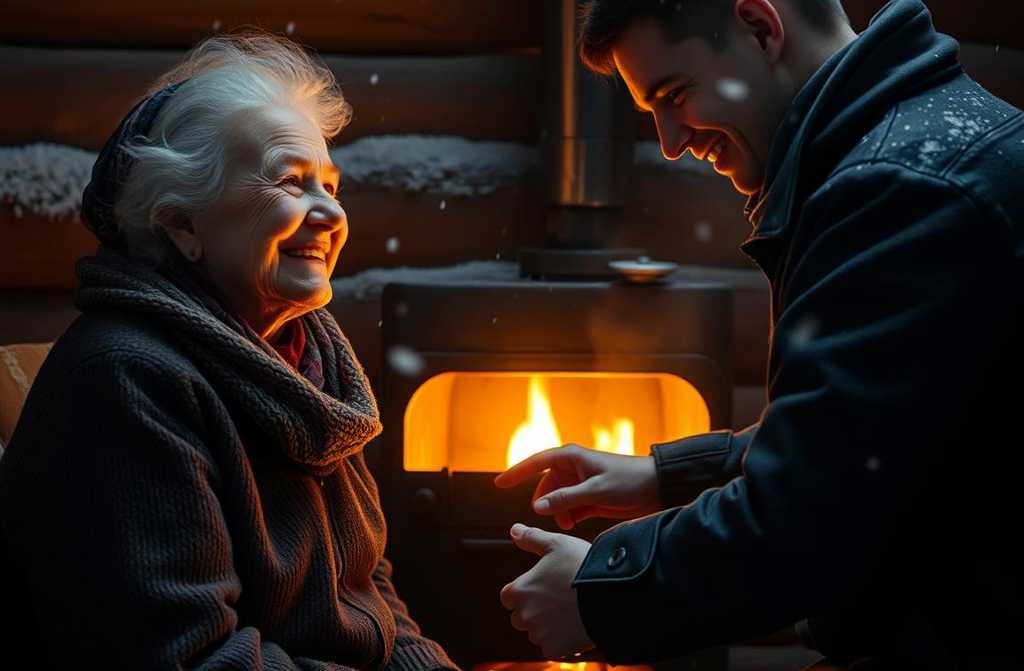**Smoke Over the Chimney**
“Anyone home?” Jeremiah hunched his shoulders as he stepped over the high wooden threshold. “Come greet your guest, Auntie!”
Behind the floral screen, an old iron bed creaked. The screen twitched, bright peonies dancing across the burgundy cotton.
“Jerry, is that you?”
“Aye, Aunt Barbara. Brought you some treats for Lady Day.”
Barbara sat up, swinging her swollen legs over the edge, fumbling for her wellingtons beside the bed. Then she shuffled out from behind the screen, wrapped her arms around Jeremiah, and pressed her forehead to his chest.
“Well, hello, my dear heart! Not seen you since Candlemas. Id just dozed off by the fire.”
“Here, take this.”
Jeremiah handed her a bag, and with her usual grumbling affection, Barbara began unpacking the goods onto the table.
“Whats all this for? I barely need a thing! That last box of tea you brought, I only just opened it. Youre making a fuss over nothing.”
Jeremiah hardly listened. When did the old woman ever accept a gift without complaint? He glanced around the cottage, remembering summers spent here as a boy. Back then, Barbara had been spry, quick on her feet. Shed buried her husband young and managed the farm alone ever since.
Now she only had her tabby cat, but once, the yard had been alive with animals. Her sons, though they lived in town, knew their way around country workhaymaking, digging potatoes, mending fences. Jeremiah had visited too; after all, Barbara was his blood.
Her eldest had died after a long illness, and the younger had thrown his back out. Months bedridden, then confined to a wheelchair. Not much use for a farmer. No one came to see her now, but still, Barbara bustledgathering herbs for salves, drying apples for pies, pickling cucumbers, knitting socks.
The house used to brim with flowers, but now only an aloe sat on the windowsill, half-frostbitten. The chores had grown too heavy.
Jeremiah moved to the hearth and pressed his palm to the whitewashed brick.
“Bit chilly in here, Aunt Barbara.”
“Well, its not summer, is it?” she deflected, scolding the cat twining round her ankles.
“Did you not light the stove today?” He felt none of its usual warmth.
“Got the range going this morningthats enough. Its not freezing out!”
“Not summer either,” Jeremiah echoed. “And whyd you take up the rugs? Cant you feel the draft from the cellar?”
“Took ’em up cause I kept tripping! Wait till youre my ageyou wont fancy dancing round them either.”
“Run out of firewood, then?”
“Got enough to last twenty years!” She tucked a wisp of grey hair under her scarf. “Two sheds full, and a stack in the barn besides.”
Barbara planted her hands on her hips and faced the stove.
An old quilt hung precariously over the edgeready to slip any moment. Instead of fixing it, she tugged it further down.
“The range does me fine.”
“Lets have a look, then.” Jeremiah pushed the quilt aside.
A jagged crack split the brickwork.
Barbara had noticed it in early autumn. Shed hoped the flue was sound, that it might holdbut the crack had other ideas. Smoke seeped through, hanging in a greasy haze between floor and ceiling. After breathing it in for weeks, shed told no oneher son had enough troubles, and he was poorly besides. Shed resolved to winter without the stove, relying on the trusty range.
Jeremiah frowned. How had he missed it last February? Clever Aunt Barbaradraped the crack with a quilt, weighed it down with an onion crate. Whod guess it hid anything?
“How longs this been here?” He nodded at the stove.
“Oh, dont recall exactly. Not long.” She fussed with her apron. “Covered it up properhardly any smoke. When its bitter out, I light the stove anyway. Drafts better in the cold. But when it snows, I make do with the range. Dont need much heat at my age.”
“What nonsense, Aunt Barbara! Im not half your years, and my bones ache for warmth! Dont you know a stoves best for old bones?”
Jeremiah scowled, tossed the quilt aside, and inspected the damage. His grandfather had been a masons apprentice, but hed died before passing on the skill. Jeremiah had picked up enough over the years to rebuild his own hearthno great mystery to it.
Proper masons were scarce now. The local paper advertised stove-fixers, but village folk distrusted themcharging a fortune for shoddy work. City lads who built stingy, cold things.
A stoves the heart of a home. Warmth, a kitchen, a remedy for aches. Nothing else soothes old bones like it. And whoever hasnt tasted stew slow-cooked in its belly hasnt lived.
“Well fix it by autumn,” Jeremiah said, stepping back. “Too cold nowyoud freeze without the range.”
“Oh, Jerry, dont trouble yourself!” Barbara flapped her hands. “Im past eightythis old stovell see me out!”
“Dont fret. Wont need a full rebuildjust the heat shield.”
“Even so! This winter mightve been my lastyou dont know!”
“Do you?”
“No. Thats for God to say.”
“Exactly!” Jeremiah wagged a finger. “What if youve decades left? When your time comes, youll meet the Lord warm as toast. Till then, Ill fetch you an electric heater.”
The next day, he returned with a sleek oil radiator on wheels, a long cord to reach her bedside. Showed her the dial, bid her farewell till summer, and left.
Barbara switched it on, drowsing in its glow. What a luxury, this modern warmth!
But her joy vanished when she woke and glimpsed the electricity meter spinning like a top. From that moment, the heater stayed off. If she craved warmth, she knelt by the open range door. Aprils chill was bearable.
Jeremiah left for his next shift with a clear conscience. Summer wasnt far, and the last cold snaps could be weathered with the electric stove.
Work was scarce in his town; he had to roam, though he hated it. The children were grown, his wife used to his absencesbut loneliness gnawed at him. Still, life was what it was: one job to the next, brief visits home, years ticking by in strangers lands.
* * *
Autumn came before he could start repairshis boss wouldnt grant leave sooner. Hed thought to hire help, then changed his mind. His grandfathers blood ran strong in him; he relished such tasks.
Aunt Barbara fretted as he worked, sweeping soot into a bucket, carrying out blackened bricks, sighing at the gaping hole in the heat shield.
The job lasted his whole leave, but he rode away lightheartedlighter still when he glanced back and saw blue smoke curling from the chimney.
At Christmas, he visited again. From the lane, he spotted that same wisp above the roof. So long as it rose, the house lived.
Inside, the stove blazed. Barbara poked the embers with a fire iron, the heat wrapping round them like a blanket, the scent of burning oak in the air.
“Jerry! I knew youd come! Got porridge simmering, and a pot of soup.”
“These are for you.” He set down a laden bag. “For the feast. Well keep Christmas proper tonight!”
The cottage smelled of mint tea. Before the icon, a lamps tiny flame danced.
Barbara laid out her best china, saved for high days.
“Nothing like stove-cooked food.” Jeremiah spooned fluffy buckwheat from the cast-iron pot.
“That dollop of butters yoursyouve earned it.” Her eyes glistened.
“Dont talk daft. Ive done nowt special.”
Barbara took a deep breath. “These last winters Ive feared them. You were rightold bones crave warmth. When that crack spread, I thought my time had come. But the Lord gave me strength, and you brought that radiator.” She shot the unused heater a dark look. “Dreaded the next winter, watching that crack grow. But your handsjust like your granddads. What a job youve done!”
“Wasnt much.” He shifted, uncomfortable with praise.
“Dont say that! Youd barely left when the snows came! But I was snugjust fed the stove. That butters yours by rights.”
“Enough chatter. Lets eat.”
The low winter sun dipped behind the pines. Behind the stoves iron door, red embers hissed around the bubbling pot.
**Lesson learned:** A house lives by its hearth. And sometimes, the simplest warmth







